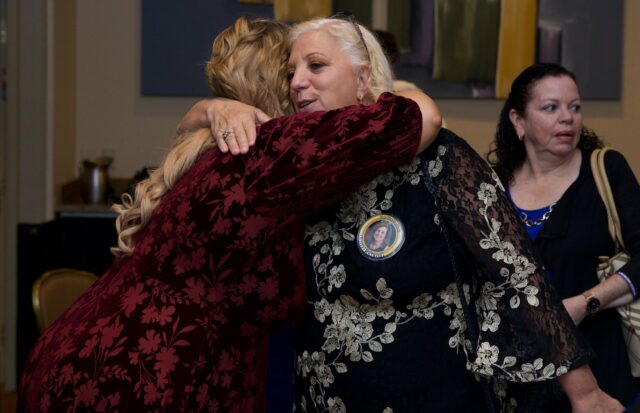
Greylock Federal Credit Union Vice President Cindy Shogry-Raimer supervises a team of financial coaches who also advocate for the financial needs of customers who are survivors of domestic violence. Greylock recently opened a Community Empowerment Center to hold more classes and give community partners a place to meet with clients in Greylock’s coaching program. Photo courtesy of Greylock Federal Credit Union
One woman had 30 student loan entries on her credit report; none were hers. Another had no savings account and needed to defer loan payments because she had spent the summer living in a tent. A third woman had a secure job but discovered credit problems after her husband went to prison for trying to hit her with his car.
These women were dealing with physical abuse from domestic violence while also experiencing a less visible but almost universal component of intimate partner violence: financial abuse.
A tactic used to control relationships, financial abuse is often the answer to the question of why people remain in domestic violence situations.
“We know that financial abuse occurs in 99 percent of all domestic violence cases in some form,” said Kim Pentico, director of the economic justice program at the National Network to End Domestic Violence (NNEDV). “What we also know from survivors is that’s what often traps them in the relationship or forces them to return because they don’t have access to resources.”
October is Domestic Violence Awareness month and offers a reminder of the banking industry’s connection to these complex and disturbing situations. From donating to domestic violence organizations to helping people raise their credit scores, some Massachusetts banks and credit unions have taken steps to understand financial abuse and support customers experiencing domestic violence.
Financial, Domestic Abuse Coincide
Domestic violence is defined as a pattern of behavior that intimidates and threatens a current or former intimate partner. According to the National Coalition Against Domestic Violence, one in four women and one in nine men have experienced severe domestic violence. And one in three women and one in four men have experienced some form of intimate partner physical violence, though not always within the definition of domestic violence.
Financial abuse touches almost everyone experiencing intimate partner violence. A 2011 study by the University of Wisconsin-Madison found financial abuse in 99 percent of domestic violence situations.
Metro Credit Union Honors Employee with Domestic Violence Fundraiser
Employees of Chelsea-based Metro Credit Union experienced firsthand the effects of domestic violence last December. Ersilia Cataldo Matarazzo had worked at the credit union for 20 years when she was fatally shot in front of her parents’ house in Everett. Her estranged husband has been charged with her murder. Read more.
Financial abuse includes stealing money from a partner’s wallet and activities that ruin credit scores, such as misusing a debit or credit card, fraudulently taking out a line of credit and not repaying debt in the partner’s name, NNEDV’s Pentico said. Other abusers do not let partners have any banking products in their name, leaving them with no resources and making them “credit invisible.”
Job loss is also tied to financial abuse, since physical violence could prevent someone from going to work, or a partner’s harassment could cause distractions affecting a workplace.
With no access to money, bad credit or limited knowledge about financial products, those experiencing domestic violence have few resources for leaving abusive relationships.

Amata Cataldo, daughter of Metro Credit Union employee Ersilia Cataldo Matarazzo, is hugged by Cataldo Matarazzo’s friend and fellow Kiwanis member, Joanne Gregory, right. Cataldo Matarazzo was murdered in December 2018, allegedly by her estranged husband. Photo courtesy of Metro Credit Union
Bank’s Brand a Powerful Tool
The Independence Project, a microlending program run by NNEDV helps financial abuse survivors build and improve their credit scores. Anyone who meets with a domestic violence advocate can apply for a $100 no-interest loan and then repay it in 10 monthly installments reported to credit bureaus. Applicants with enough monthly finances to cover a $10 repayment will receive a loan and, after repaying one loan, can apply again to continue raising credit scores.
As part of a domestic violence awareness initiative, Santander Bank donated $200,000 to the NNEDV program. Laurie Kight, Santander Bank’s senior vice president of communications, said beyond making a donation, the bank wanted to leverage its brand to raise awareness about financial abuse.
“We really believe that change starts with awareness and education,” Kight said. “It’s a deep, pervasive issue, very complicated and disturbingly large.”
Along with the donation to the NNEDV, $81.4 billion-asset Santander partnered with the National Coalition Against Domestic Violence to introduce an online financial literacy program. The bank also sponsored an exhibit in New York City in early October called “In Someone Else’s Shoes,” an immersive experience that gave bank employees and members of the public insight into what a person goes through when experiencing domestic violence and financial abuse.
Uncovering Survivors’ Stories
Community development financial institutions can also play a role. Andy Posner is the founder and CEO of The Capital Good Fund, a Rhode Island-based CDFI that offers loans to people with low- and moderate-incomes in several states, including Massachusetts. He said many clients are referred from domestic violence organizations for emergency loans, and the repayments help borrowers raise their credit scores.
Greylock Federal Credit Union, also a CDFI, takes a community approach to helping customers experiencing financial abuse. The $1.24 billion-asset, Pittsfield-based credit union began offering one-on-one coaching sessions with customers in 2016. After holding about 800 sessions from 2016 through 2018, Greylock has already provided more than 900 through Sept. 30.
While not all coaching sessions involve domestic violence, many do, said Cindy Shogry-Raimer, Greylock’s vice president and director of community development. Along with three full-time certified credit union financial counselors, another 13 employees spend at least some of their time coaching.
Along with providing loans and other financial products, Greylock’s coaches build trust with survivors, often leading to a better understanding of the situation. Shogry-Raimer said the stigma associated with domestic violence discourages many people from revealing their financial abuse. She likened a coach’s efforts to “peeling back the layers of an onion.”
“There’s always a story there, but depending on the situation, it’s not always shared unless there’s trust that it’s not going to be used against them,” Shogry-Raimer said. “Then they’ll share with you.”
Advocates for Survivors
Coaches often uncover fraudulent activity inflicted by abusers, transforming them into advocates for their customers.
The woman with 30 fraudulent student loan entries on her credit report met with a Greylock coach who helped her dispute the student loans and other items on her credit report that were not hers. The coach also helped her sign up for Experian Boost so that on-time utility and cell phone payments could count on her credit report and improve her score.

Diane McLauglin
The customer whose husband tried to hit her with a car received help from a Greylock coach to create a budget for paying her mortgage and to get hardship rate reductions on her credit cards. They continue to work on improving her credit profile, which was affected by joint debt with her husband.
The consequences of financial abuse go beyond banking products, and Shogry-Raimer said Greylock has partnerships throughout the community to offer further assistance. The woman dealing with the fraudulent student loans still lives with her abuser, and the coach referred her to the Elizabeth Freeman Center, a local domestic violence support organization, for assistance.
The woman who spent a summer living in a tent had left her abuser, eventually finding a job and small apartment. But she could not afford heat and was struggling to pay rent. The Greylock coach referred her to the Berkshire Community Action Council for fuel assistance, provided her with the locations of local food pantries and meal sites, and helped her apply for food stamps.
Shogry-Raimer said she tells others within the financial industry about Greylock’s work, encouraging more people to work toward addressing financial abuse.
“I’m not looking to corner the market,” Shogry-Raimer said. “We can’t do it alone; we can’t just work in silos; we have to do it together.”




 |
| 

